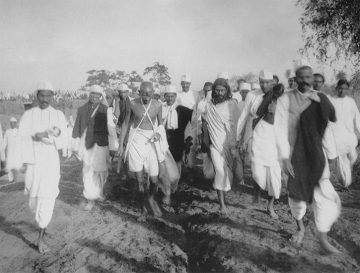Rafia Zakaria in Baffler:
 THE FIRST TIME MOHANDAS GANDHI, the leader of nonviolent protest against British rule in India, wrote to Adolf Hitler was in July of 1939. Gandhi was almost seventy. The world was, as it appears to be today, on the cusp of some huge transformation, although then, as now, the complete price of the change was unknown. “Dear friend,” Gandhi implored Hitler from behind a typewritten page, “friends have been urging me to write to you for the sake of humanity.” Hitler, the letter goes on to say, is the only “person in the world who can prevent a war which may reduce humanity to a savage state.”
THE FIRST TIME MOHANDAS GANDHI, the leader of nonviolent protest against British rule in India, wrote to Adolf Hitler was in July of 1939. Gandhi was almost seventy. The world was, as it appears to be today, on the cusp of some huge transformation, although then, as now, the complete price of the change was unknown. “Dear friend,” Gandhi implored Hitler from behind a typewritten page, “friends have been urging me to write to you for the sake of humanity.” Hitler, the letter goes on to say, is the only “person in the world who can prevent a war which may reduce humanity to a savage state.”
I can imagine Gandhi writing the letter, the humid air of an Indian July hanging heavy and oppressive, like the threat of war over the world. That first letter was barely over a hundred words, and it was never delivered. The British colonists who ruled India at the time minded Gandhi’s correspondence; they intercepted it well before it had any chance to reach Hitler. It is unknown whether Gandhi, an astute political strategist, knew this would be the case when he wrote the letter. He may have known that his audience was his own oppressors rather than the oppressors of European Jews. Whatever Gandhi’s motives, the appeal to Hitler was not new. The year before, American missionaries meeting with Gandhi pleaded with him to condemn Hitler and Mussolini, but he refused, insisting that no one, even these two fascists clearly uninterested in human dignity, was “beyond redemption.” Czechs and Jews were told to engage only in passive resistance, a sacrifice that would redeem them. Passive resistance failed to deliver either group, but Gandhi, for his part, never quite acknowledged this. (It was also not the only strategy they employed: consider the Warsaw Uprising of 1943, or the revolt at Auschwitz-Birkenau the following year.) Gandhi did write another, more vehement letter to Hitler, but this, too, was never delivered.
Gandhi got many things wrong about World War II. But in the days after George Floyd’s death, with protest ascendant, many reached for his prescriptions and other histories of nonviolent resistance, which present crucial questions about methods of opposition and defense. While there is much talk of the passive nonviolent resisters of old—Gandhi and his eventual disciple Martin Luther King Jr.—there is physical, psychic, and emotional violence being deliberately inflicted on the oppressed.
More here.
